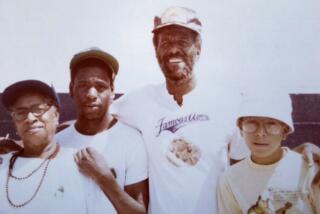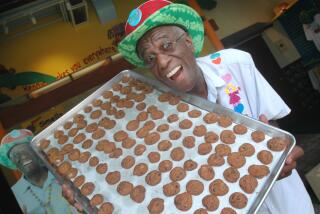Dave Thomas, 69; Founded Wendy’s Chain
- Share via
Dave Thomas, the folksy founder of Wendy’s Old-Fashioned Hamburgers who parlayed his taste for good food and friendly service and an innate knack for talking to people from their television sets into one of the world’s most successful fast-food chains, died Tuesday. He was 69.
Thomas, an adoptee who over the past decade waged an aggressive campaign to promote adoption in America, died at his Fort Lauderdale, Fla., home of liver cancer, company spokesmen said.
Thomas had been undergoing kidney dialysis since early last year and had a quadruple heart bypass five years ago after suffering a heart attack.
Born in Atlantic City, N.J., to unwed parents, Thomas was quickly adopted but lost his new mother to rheumatic fever when he was 5. His father, a construction worker, introduced him to three successive stepmothers and a dozen homes before he was 15. Given those unusual beginnings, R. David Thomas seemed an unlikely candidate to become an internationally recognized restaurant tycoon.
Yet at his death he remained what Wendy’s Chairman Jack Schuessler called “the heart and soul of our company,” which has 6,000 restaurants around the world and, with its Canadian subsidiary Tim Hortons, has sales of more than $8 billion a year.
By the time the high school dropout finally earned his equivalency diploma in 1993, his classmates had good reason to vote him most likely to succeed.
Two lessons from Thomas’ early life set him on his course, he said in his three autobiographical books, the 1991 “Dave’s Way: A New Approach to Old-Fashioned Success,” the 1994 “Well Done: Dave’s Secret Recipe for Everyday Success” and the 2000 “Franchising for Dummies.”
First, his adoptive maternal grandmother Minnie Sinclair, the only relative who gave him a sense of security, taught him to value hard work as a pleasurable, constant companion.
Second, his frequent visits to cheap restaurants with his father made him decide, he wrote, “to own my own restaurant because I liked to eat, and I just thought restaurants were really neat, exciting places.”
Thomas worked odd jobs as a boy, delivering groceries, working at a soda fountain and tending a restaurant counter. At 15, he began working as a busboy at the Hobby House restaurant in Fort Wayne, Ind., and when his father decided to pull up stakes, Thomas declared himself emancipated and moved into the YMCA.
His boss, Phil Clauss, became a mentor and, after Thomas served as an Army cook in West Germany during the Korean War, promoted him to assistant manager of his newest restaurant.
It was in Fort Wayne that Thomas met another mentor, Col. Harland Sanders, who stopped by to promote his Kentucky Fried Chicken franchises.
Clauss acquired four KFC franchises in Columbus, Ohio, and, when they did poorly, sent Thomas to turn them around in exchange for 45% ownership. Thomas succeeded, and in 1968 sold his interest back to KFC for $1 million in stock.
A year later, he established his own company, opening the first Wendy’s in Columbus on Nov. 15, 1969. The name was the nickname of his daughter Melinda Lou, who was 8.
With its homey decor of carpets, Tiffany-style lamps and bentwood chairs, a friendly staff and food cooked to order, the restaurant quickly flourished. Within six weeks, Thomas turned a profit, and within four years he was negotiating franchise arrangements for entire cities and geographical regions.
By the late 1970s, profits of the Dublin, Ohio-based corporation were soaring, and in 1982 Thomas stepped down as chief executive and went to Florida to play golf.
A catchy “Where’s the beef?” ad campaign kept the chain growing for a few years, but then business sagged because, in Thomas’ opinion, service “began to get sloppy.”
So in 1989, after installing James Near as Wendy’s chief executive, Thomas went back to work as roving quality-control man and chief spokesman. Unhappy with the commercials that replaced the oft-quoted ones about meaty hamburgers, Thomas went off to talk to the advertising agency.
His pep talk on how Wendy’s makes hamburgers and treats customers was so convincing that the admen decided to have Thomas tell the story on camera.
The founder, who thought he might make one or two commercials, proved a durable pitchman, making more than 725 humorous ads that often featured foreign locations or celebrities such as bluesman B.B. King, soap opera star Susan Lucci and ice skater Kristi Yamaguchi.
Wendy’s sales zoomed, and Thomas soon became so well-known that people all over the world felt comfortable initiating conversations with “Dave.”
No trained actor, the chief executive with the limited education had trouble making the commercials until producers stopped putting their perfectly written phrases in his mouth and let him talk in his own scrambled syntax. By one somewhat tongue-in-cheek estimate, shooting the first 10 years of the ads required more than 619,000 miles of film, 10,000 hours of editing and 1.1 million cups of coffee.
But the results were indisputable. As one financial analyst said in 1991, Thomas “has given Wendy’s a corporate identity ... a down-homey type image. The lack of sophistication is a real benefit for the company.”
No matter how successful he became, Thomas never forgot his adoptive roots or his sense of abandonment when he finally learned at the age of 13 that he was adopted. He told The Times in 1999 he felt so ashamed that he never mentioned his adoption until the late 1980s.
He was giving a motivational speech to Wendy’s managers and told of his adoption to illustrate his point that success was not based on having a privileged background. One manager suggested that Thomas go public with his story to raise public awareness of the importance of adoption--sparking a personal crusade that would last the remainder of Thomas’ life.
“Every child deserves a home and love. Period,” Thomas said to anybody or group who would listen, including Congress.
In 1990, Thomas headed former President George Bush’s adoption initiative, Adoption Works ... for Everyone. Thomas spoke to corporate America and government employers about creating adoption benefits for employees and started Wendy’s corporate adoption program. He promoted adoption of older and handicapped children, and posed for posters, surrounded by children and stating: “Adopt a special child. They grow up to be special people.”
In 1992, he founded the Dave Thomas Foundation for Adoption to raise awareness about the issue’s importance, and devoted his speaking fees and profits from his books to support it.
Thomas is survived by his wife, Lorraine; five children, Pam, Ken, Molly, Melinda Lou and Lori; and 16 grandchildren.
*
END OF AN IMAGE Branding experts say Wendy’s has its work cut out for it. C1
More to Read
Eat your way across L.A.
Get our weekly Tasting Notes newsletter for reviews, news and more.
You may occasionally receive promotional content from the Los Angeles Times.










